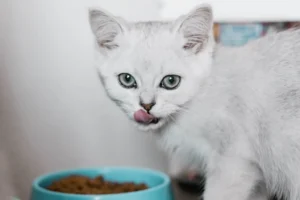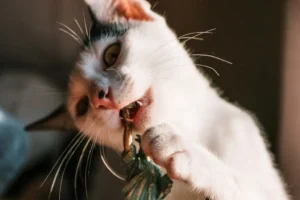Have you ever noticed your cat looking a bit absent-minded, lost in their own thoughts? It’s a common occurrence that can leave cat owners wondering what’s going on in their furry friend’s mind. In this blog post, we will explore the reasons behind why your cat may appear absent-minded and what you can do to help them.
The reason your cat may appear absent-minded is often due to their natural behaviors and instincts. While it may seem like your cat is lost in thought, they are likely just exhibiting typical feline behaviors that can sometimes come across as absent-mindedness.
Is Your Cat Daydreaming or Focused on a Stimulus?
Have you ever caught your cat staring off into space, seemingly lost in their thoughts? It’s easy to assume they’re absent-minded, but cats can also enter a state of deep focus on a specific stimulus. For example, if your cat is intensely watching a bird outside the window, they may seem absent-minded to you, but they are actually fully engaged in what they’re observing.
To distinguish between your cat daydreaming and being focused on a stimulus, pay attention to their body language. If their eyes are slightly glazed over and they seem unresponsive to their surroundings, they might be in a daydreaming state. On the other hand, if their eyes are sharp and alert, and their body is tense and ready to pounce, they are likely intensely focused on something specific.
Remember, cats have a natural instinct to hunt, so when they are locked in on a stimulus, it’s a sign that their predatory instincts are kicking in. So, next time you catch your cat looking absent-minded, take a closer look at what has captured their attention – it might just be a fascinating bug or a bird’s movements that have piqued their interest.
The Role of Body Language in Your Cat’s Behavior
Your cat’s body language can speak volumes about their mental state and whether they are truly absent-minded or focused on something important. To understand your cat better, pay attention to their tail, ears, and eyes.
When your cat’s tail is high in the air and gently twitching, it usually indicates excitement or arousal. If their ears are perked up and facing forward, they are actively engaged in their surroundings. Additionally, dilated pupils can suggest intense focus or excitement.
If your cat appears relaxed with their tail low or wrapped around their body, ears facing backward, and half-closed eyes, they may be more in a daydreaming state. However, if their body is tense, tail flicking rapidly, and eyes wide open, they are likely focusing intently on something.
Understanding your cat‘s body language will help you decipher whether they are truly absent-minded or just deeply engrossed in a particular stimulus. By observing their cues, you can gain valuable insights into their thoughts and behaviors.
For further information on cat behavior and body language, you can check out the experts at the American Society for the Prevention of Cruelty to Animals (ASPCA) for more in-depth insights.
Environmental Enrichment for a More Engaged Cat
If your cat seems absent-minded, it might be craving more mental stimulation. Providing environmental enrichment can keep your cat engaged and prevent them from appearing spacey. Try incorporating interactive toys like puzzle feeders or laser pointers to keep your feline friend’s mind active. Creating vertical space with cat trees or shelves can also encourage climbing and exploration, keeping your cat’s brain busy.
To further engage your cat, consider rotating toys regularly to prevent boredom. Cats are natural hunters, so hiding treats around the house or using food-dispensing toys can satisfy their instincts and keep them mentally sharp. Additionally, incorporating scratching posts and cozy hiding spots can fulfill your cat’s natural behaviors, preventing them from zoning out or appearing absent-minded.
For a more engaged cat, ensure they have access to windows for bird watching and natural sunlight, as well as safe outdoor spaces like enclosed patios or catio enclosures. These environmental elements can provide mental stimulation and prevent your cat from feeling bored or disinterested.
Extra Tip : Consider setting up a DIY scavenger hunt for your cat by hiding toys or treats around the house. This activity can keep them mentally stimulated and prevent them from looking absent-minded.
The Impact of Age on Your Cat’s Behavior
As cats age, they may experience changes in behavior that could contribute to them appearing absent-minded. Senior cats may exhibit signs of cognitive dysfunction, such as disorientation, forgetfulness, or altered sleep patterns. These age-related changes can make your cat seem less alert or aware of their surroundings.
To support your aging cat, provide comfortable bedding in warm, quiet areas and ensure easy access to food, water, and litter boxes. Regular veterinary check-ups can help identify any underlying health issues that may be affecting your cat’s behavior. Additionally, interactive play sessions and gentle grooming can provide mental stimulation and physical comfort for older cats.
If your senior cat is displaying absent-minded behavior, consider introducing specialized toys designed for cognitive enrichment, such as puzzle feeders or interactive games. These can help keep your cat’s mind active and engaged, reducing the appearance of absent-mindedness associated with aging.
By understanding the impact of age on your cat’s behavior and implementing strategies to support their mental and physical well-being, you can help your furry companion age gracefully and maintain a more alert and engaged presence.
Understanding Stress and Anxiety in Cats
Stress and anxiety can affect cats just like it can affect humans. When your cat appears absent-minded, it could be a sign of underlying stress or anxiety. Keep an eye out for other behavioral changes such as hiding, excessive grooming, or aggression towards other pets. Providing a calm and stable environment for your feline friend can help alleviate these feelings. Interactive toys, vertical space for climbing, and hiding spots can also help reduce stress levels in cats.
The Importance of Regular Vet Check-ups
Regular vet check-ups are crucial in ruling out any underlying medical issues that could be causing your cat to look absent-minded. Cats are masters at hiding signs of illness, so it’s important to schedule routine visits to ensure your furry companion is in good health. Remember, prevention is always better than cure. In addition to regular check-ups, be sure to keep up with vaccinations, parasite control, and dental care to keep your cat happy and healthy.
Additional Unique Insight: Gray hairs in your cat’s coat could be a sign of stress or aging. Keep an eye out for any changes in your cat’s fur color as it could indicate underlying health issues or emotional distress.
Remember, your cat’s well-being is your responsibility, and taking the time to understand their behavior is key to providing them with the care and love they deserve. By being proactive and observant, you can ensure your cat is happy, healthy, and engaged in their environment.
Fun Facts About Cat Behavior
Cats may appear absent-minded at times, but it’s actually a fascinating aspect of their behavior. Here are some fun facts to help you better understand why your feline friend may seem lost in thought:
Inquisitive Nature : Cats are naturally curious creatures, constantly exploring their surroundings and investigating new things. This can make them appear distracted or lost in their own world.
Daydreamers : Believe it or not, cats can daydream just like humans! Sometimes when your cat seems absent-minded, they may be lost in a world of their own, thinking about who knows what.
Visual Processing : Cats have excellent vision, which means they can get caught up in observing even the smallest of movements. So, that far-off look in their eyes might be them intensely focusing on something you can’t even see.
Mindfulness : Cats are masters of mindfulness, living in the moment and not worrying about the past or future. So, when your cat looks off into the distance, they could simply be practicing their zen meditation.
Selective Attention : Cats have the ability to focus intensely on one thing while seemingly ignoring everything else. So, when your cat appears absent-minded, they might just be zeroing in on a specific sound or scent.
Remember, your cat’s absent-minded behavior is all part of their unique personality and instincts. Embrace their quirks and enjoy the mystery of your feline friend’s mind!
For more insights into cat behavior, you can explore this helpful resource: Understanding Your Cat’s Behavior
Alex, a passionate animal lover, has experience in training and understanding animal behavior. As a proud pet parent to two dogs and three cats, he founded AnimalReport.net to share insights from animal experts and expand his knowledge of the animal kingdom.









